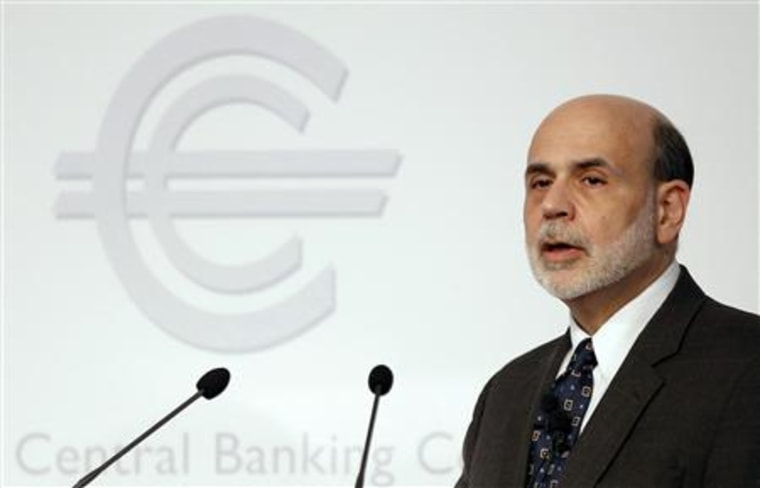Federal Reserve Chairman Ben Bernanke hit back on Friday at critics of the U.S. central bank's bond-buying program and issued a thinly veiled attack on China's policy of keeping its currency on a leash.
In his first speech since the Fed announced the program Nov. 3, Bernanke also made his most forceful case to date that Congress also must provide more stimulus aid.
Without more stimulus, high unemployment could persist for years, he said. But in making that argument, Bernanke risks heightening complaints that he's plunging the Fed into partisan politics.
Bernanke, facing a chorus of protests about the asset-buying spree from within and outside the central bank, said a more vigorous U.S. economy was essential to fuel the global recovery and dismissed charges he was debasing the dollar.
"The best way to continue to deliver the strong economic fundamentals that underpin the value of the dollar, as well as to support the global recovery, is through policies that lead to a resumption of robust growth in a context of price stability in the United States," Bernanke said in a speech to a conference at the European Central Bank in Frankfurt.
The Fed's Nov. 3 decision to buy a further $600 billion in U.S. government debt with new money generated outrage among policymakers in many nations, who accused the United States of seeking to weaken the dollar to gain an export edge.
German Finance Minister Wolfgang Schaeuble called the policy "clueless."
Critics at home, including Republican leaders in Congress and some Fed officials, say they doubt the program will help the economy. They also worry it could do harm — unleashing inflation and leading to speculative buying on Wall Street.
Fed officials circled their wagons this week to defend the program. Two added their endorsement on Thursday, but another expressed opposition and a fourth said monetary policy should not play the main role in driving a stronger recovery.
"Deficits and surpluses are generated by many countries' behavior not a single currency," Bernanke said in a later panel discussion with IMF Managing Director Dominique Strauss-Kahn and European Central Bank President Jean-Claude Trichet.
"It will be very difficult for exchange rates by themselves to restore the balance and so I think structural adjustments on both sides are necessary," Bernanke said.
Strauss-Kahn said he too recognized the difficulties involved but said global imbalances could not be tackled without "important changes in the relative values in the currencies."
"We need to move in that direction," he said.
Addressing international criticism of the Fed's action, Bernanke said much of the recent weakness of the dollar reflected an unwinding of the increases that were notched as investors fled to the safety of the greenback during the European sovereign debt crisis in the spring.
Many emerging economies have worried that volatile investment inflows sparked by the dollar's decline could be destabilizing -- either fuelling inflation or asset bubbles.
Bernanke said the failure of some emerging market economies with trade surpluses to allow their currencies to appreciate was making the problems those countries face worse.
"Currency undervaluation by surplus countries is inhibiting needed international adjustment and creating spillover effects that would not exist if exchange rates better reflected market fundamentals," he said, without explicitly pointing to China.
U.S. officials have long argued that an undervalued Chinese yuan gives the Asian export powerhouse an unfair advantage.
Bernanke said inflexible currencies were preventing a needed rebalancing of global growth and could end up destabilizing the world economy.
"For large, systemically important countries with persistent current account surpluses, the pursuit of export-led growth cannot ultimately succeed if the implications of that strategy for global growth and stability are not taken into account," he said.
Bernanke said sluggish U.S. growth, falling inflation and an unemployment rate that has hovered near 10 percent for months convinced Fed policymakers they needed to pump in more stimulus.
"On its current economic trajectory, the United States runs the risk of seeing millions of workers unemployed or underemployed for many years," he said in his speech. "As a society, we should find that unacceptable."
Even so, the Fed's program by itself can't fix all the economy's problems, Bernanke said.
"There are limits to what can be achieved by the central bank alone," he said, tamping down expectations.
"A fiscal program that combines near-term measures to enhance growth with strong confidence-inducing steps to reduce longer-term structural (budget) deficits would be an important complement to the policies of the Federal Reserve," he said.
Bernanke has previously warned that the economy is too fragile for the Congress to slash spending or boost taxes, even as he has made the case that lawmakers and the White House must craft a credible plan to reduce trillion-dollar plus budget deficits over the long term.
But the Fed chief amplified that warning. He is doing so as Republicans in Congress — coming off big wins in the midterm elections — are using their clout to push for less government spending and more fiscal discipline.
Republicans are upset with Bernanke because they think the Fed is overstepping its bounds with the bond-buying program. They argue that the Fed is printing money to pay for the government's massive debt.
Republicans Rep. Mike Pence and Sen. Bob Corker, want the Fed's mission to be revamped.
They want the Fed to focus solely on keeping inflation in check. It now has a "dual mandate" from Congress: to keep both inflation and unemployment low.
Put on the defensive, Bernanke felt compelled this week to meet privately with lawmakers on the Senate Banking Committee to defend the Fed's program. A stream of Bernanke's colleagues have also been out making public appearances to back the Fed's action in recent days. Narayana Kocherlakota, president of the Federal Reserve Bank of Minneapolis, and Sandra Pianalto, president of the Cleveland Fed, were on the circuit Thursday.
